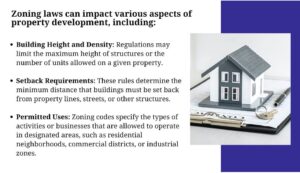Have you ever dreamed of buying your own home or investing in a rental property?

Image Credits: Canva
Real estate can be an exciting venture, but understanding the legal landscape is crucial to protect yourself and ensure a smooth transaction.
This comprehensive guide will equip you with fundamental knowledge of real estate law, from property rights and contracts to zoning laws and fair housing regulations, whether you’re a buyer, seller, landlord, or tenant.
Understanding Property Rights and Ownership
Overview of Property Rights
Property ownership is a multifaceted concept that extends beyond merely owning the surface land. It encompasses various layers of rights that define the extent of an owner’s legal entitlements. These layers consist of:
- Surface Rights: These rights pertain to the ownership and usage of the land’s surface, allowing property owners to build structures, cultivate crops, or engage in other approved activities on the land.
- Subsurface Rights: Subsurface rights grant ownership and control over the resources found beneath the surface of the property, such as minerals, oil, and gas deposits. These rights can be separately owned or transferred, enabling property owners to lease or sell these resources to third parties.
- Air Rights: Air rights refer to the ownership and control of the airspace above a property. These rights determine the extent to which an owner can develop vertically, construct tall buildings, or potentially sell the air rights to neighboring properties.
Understanding these distinct layers is crucial for determining the full scope of your property ownership and the associated usage rights and limitations. As the quote from Investopedia highlights, Property rights define the theoretical bundle of rights that ownership of real estate bestows upon the owner.
Title Searches and Ownership Verification
Before finalizing a real estate transaction, conducting a thorough title search to verify the seller’s legal ownership and identify any potential encumbrances or liens is essential. This process involves examining public records, including deeds, mortgages, and other legal documents, to establish a clear chain of title.
Engaging the services of a reputable title company is crucial. These specialized companies have the expertise to thoroughly investigate the property’s history and uncover any outstanding issues that could affect the transfer of ownership. A clear and marketable title is essential for a smooth, secure real estate transaction.
Navigating Real Estate Transactions
Essentials of Real Estate Contracts
Real estate contracts are legally binding agreements that outline the terms and conditions of a property transaction. For a contract to be enforceable, it must include several key elements, such as:
- Identification of the parties involved,
- A clear description of the property
- The purchase price and terms of payment,
- Signatures of all parties involved
Furthermore, according to the Statute of Frauds, written agreements are mandatory to enforce legality in real estate transactions.
Common Legal Issues
Even with a well-crafted contract, legal issues may arise during real estate transactions. Two common sources of contention are:
Boundary Disputes: Unclear property boundaries can lead to contentious disputes between neighbors. Resolving these issues often requires professional land surveys and legal intervention.
Easement Disputes: An easement grants the right to use another’s property for a specific purpose, such as accessing a shared driveway or utility lines. Disputes can arise when the terms of the easement are violated or misinterpreted.
As highlighted by the Federal Trade Commission, there were 11,578 victims of real estate and rental fraud in 2021, highlighting the importance of vigilance in these matters.
Especially for transactions in locations like Lubbock, Texas, where the real estate market is booming, having a qualified real estate attorney by your side is crucial. Lubbock’s unique market conditions, with its mix of college town energy and West Texas charm, can present unforeseen legal challenges. A local real estate attorney , Lubbock can provide invaluable guidance on navigating these complexities, ensuring your rights are protected throughout the transaction process.
Whether you’re a buyer ensuring a smooth closing process or a seller facing zoning restrictions, a real estate attorney can provide tailored legal expertise to address your specific needs. Don’t hesitate to seek professional legal counsel to ensure a successful and secure real estate transaction.
Compliance and Regulatory Frameworks
Zoning Laws and Land Use Regulations
Real estate transactions and property development are subject to a wide range of zoning laws and land use regulations imposed by local municipalities and governing bodies. These regulations dictate how a property can be used and developed, often specifying permitted uses such as residential, commercial, industrial, or agricultural.

Image Credits: Canva
Non-compliance with zoning laws and land use regulations can result in costly fines, legal action, and even the demolition of non-compliant structures. Property owners and developers must thoroughly understand and adhere to these regulations to avoid potential legal and financial consequences.
Environmental Considerations
Real estate development and property usage are subject to various environmental regulations aimed at protecting natural resources and promoting sustainability. These regulations may govern aspects such as:
- Water Usage and Conservation: Restrictions on water usage, requirements for efficient irrigation systems, and measures to prevent water pollution or excessive groundwater depletion.
- Waste Management: Regulations regarding the proper disposal of construction waste, hazardous materials, or other environmental contaminants.
- Habitat and Species Protection: Restrictions on development in areas designated as wetlands, endangered species habitats, or other environmentally sensitive areas.
- Energy Efficiency and Green Building Standards: Requirements for implementing energy-efficient designs, utilizing renewable energy sources, or adhering to green building certification standards.
Role of Due Diligence and Legal Disclosures
Importance of Due Diligence
Due diligence is a critical process that all parties involved in a real estate transaction should undertake. This involves conducting a comprehensive investigation and assessment of the property to identify any potential issues or risks that could impact the transaction or future ownership.
A thorough due diligence process typically includes:
- Inspections for structural integrity and potential defects
- Title searches to verify ownership and identify any encumbrances
- Legal checks to ensure compliance with zoning and environmental regulations
Thoroughly investigating all aspects of the property and transaction during due diligence can help mitigate risks, uncover potential issues early on, and provide the necessary information for informed decision-making. Neglecting due diligence can lead to costly surprises and legal complications down the line.
Seller Disclosure Requirements
In most states, sellers are legally obligated to disclose known defects, issues, or material facts about the property to potential buyers. These disclosure requirements aim to promote transparency and protect buyers from unknowingly purchasing a property with significant problems or hidden issues.
Common examples of disclosure requirements include:
- Structural defects or damage
- Environmental hazards (e.g., lead-based paint, asbestos, mold)
- Pending legal disputes or liens on the property
- History of natural disasters or flooding
- Known problems with major systems (e.g., plumbing, electrical, HVAC)
Failure to provide accurate and complete disclosures can result in legal liabilities for the seller, including potential lawsuits for misrepresentation or fraud. Buyers may also have the right to seek compensation or even void the transaction if significant undisclosed issues are discovered after the sale.
Both buyers and sellers should carefully review disclosure documents and seek legal counsel to ensure compliance with state and local disclosure laws.
Real Estate Professionals: Duties and Liabilities
Regulation and Licensing: Real estate agents and brokers are subject to stringent licensing requirements and educational standards. These professionals must adhere to a code of ethics and undergo periodic continuing education to maintain their licenses.
Professional Liability: Real estate professionals can face legal risks and liabilities if they fail to uphold their duties or engage in unethical practices. Professional liability insurance can help protect agents and brokers from potential lawsuits and financial damages.
Fair Housing and Anti-Discrimination Practices
Fair Housing Act
The Fair Housing Act is a crucial law that prohibits discrimination in real estate transactions based on race, color, religion, national origin, sex, familial status, or disability. It aims to ensure equal housing opportunities for all individuals, regardless of their background or personal characteristics.
With significant disparities in homeownership rates, such as only 45% of Black families owning homes compared to 75% of white families, these laws are essential for promoting equity and fairness in the housing market.
Promoting Compliance and Best Practices
Real estate professionals play a vital role in promoting fair housing practices and ensuring compliance with anti-discrimination laws. This can involve implementing comprehensive training programs to educate professionals about fair housing regulations and best practices.
Additionally, Developing inclusive policies and procedures and actively addressing instances of discrimination within the industry can foster a more equitable and inclusive real estate environment.
Comparison Table
| Legal Consideration | Description | Potential Consequences |
| Zoning Laws | Regulate property usage and development | Fines, legal action, permit revocation |
| Environmental Regulations | Protect natural resources and promote sustainability | Fines, project delays, lawsuits |
| Due Diligence | Investigate the property’s condition and legal compliance | Unforeseen issues, financial losses |
| Disclosure Requirements | Obligation to disclose known defects to buyers | Lawsuits for misrepresentation or fraud |
| Fair Housing Act | Prohibits discrimination in real estate transactions | Legal action, fines, reputational damage |
FAQs
What are the essential elements of a real estate contract?
A valid real estate contract should include the identification of the parties involved, a clear description of the property, the purchase price and payment terms, and the signatures of all parties.
How do zoning laws affect property usage?
Zoning laws dictate how a property can be used and developed, regulating aspects such as the type of structure permitted, the number of units allowed, and the permitted uses (residential, commercial, industrial, etc.).
What is the role of a title company in real estate transactions?
Title companies conduct thorough title searches to verify property ownership and identify any potential encumbrances or liens. They also issue title insurance policies to protect against financial losses resulting from title defects.
Conclusion
Understanding real estate law is crucial for navigating the complex world of property ownership and transactions. From grasping property rights and zoning regulations to conducting due diligence and ensuring compliance with fair housing practices, each element plays a vital role in safeguarding your legal and financial interests.
Educating yourself on these legal intricacies as a property owner or investor can empower you to make informed decisions and mitigate potential risks. Seek professional guidance from qualified real estate attorneys and professionals to ensure a smooth and legally compliant transaction process.

